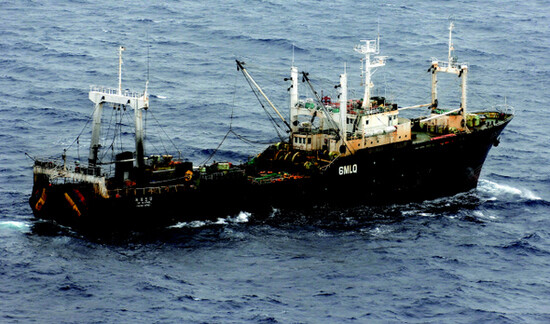hankyoreh
Links to other country sites 다른 나라 사이트 링크
Closure still not brought to allegedly abused Indonesian crews

By Ko Na-mu, Hankyoreh21 staff reporter
It wasn’t a time to be afraid. It was 10:30 am on June 11, and the sky was clear. The sunshine was pleasant. Many people had already gathered on the highway in front of Sajo Oyang’s headquarters in Seoul’s Seodaemun district. A number of them were reporters, with television news cameras in position. Yet the first words she spoke were, “I’m scared.”
Eliana Tenu, 51, held the microphone in front of the company’s office. Sajo Tuna and Oyang Clam Meat are beloved foodstuffs among Koreans, and both come from Sajo Oyang. But Tenu is unfamiliar with their flavor. For her, Sajo Oyang conjures up memories of the Oyang 75.
Last year, thirty-two Indonesian crews on board the deep-sea fishing boat affiliated with Sajo Oyang fled en masse to New Zealand after fishing in the country’s exclusive economic zone. They claimed to have suffered sexual harassment, physical and verbal abuse, and nonpayment of wages. The New Zealand government investigated before ultimately releasing an official report on March 1 in which it acknowledged the occurrence of sexual harassment.
The Korean House for International Solidarity (KHIS) filed a petition with the National Human Rights Commission of Korea (NHRCK) last year on behalf of six of the Indonesian workers. The commission dismissed it on Apr. 12, citing a lack of evidence, but issued a press release on May 15 that recommended formal reinvestigation by the South Korean government. On June 11, KHIS and the public interest law group Appeal held a press conference in front of Sajo Oyang‘s headquarters to protest the human rights infringements. Among the speakers were two of the crews (including Sekito, who was interviewed by Hankyoreh 21) and Tenu, an activist who helped them in New Zealand.
When the Hankyoreh met Tenu again on June 13, there was some sense of why she had admitted to being scared. Sitting in the KHIS offices Seoul’s Jongno district, she recalled her first meeting with the Oyang 75 sailors last year.
“On June 20, 2011, one of the Indonesian sailors who fled the Oyang 75 called me asking for help,” she said. None of them knew much English. Tenu notified the New Zealand press and civic groups of their plight. An Indonesian herself, she has lived in New Zealand since 1996.
Around two weeks after the incident, Tenu was contacted by a Sajo Oyang executive requesting a meeting. It took place in the lounge of Auckland International Airport. The company official there wanted Tenu to talk the crews into returning to the Oyang 75, but did not discuss any specific measures on minimum wages or handling the sexual harassment issue.
When asked how she felt during the June 14 press conference, Tenu said, “Worried. I thought I might be bullied.”
She added that she hoped the South Korean deep-sea fishing companies learn to get along better with people from other cultural backgrounds.
A team with representatives from the Ministry of Land, Transport and Maritime Affairs and Ministry of Foreign Affairs and Trade conducted an on-site investigation, announcing on June 10 that it had confirmed allegations of continued abuse of four Indonesian crews by four South Korean ones. The team plans to request an investigation of allegations of assault.
Please direct questions or comments to [english@hani.co.kr]
Editorial・opinion
![[Column] Season 2 of special prosecutor probe may be coming to Korea soon [Column] Season 2 of special prosecutor probe may be coming to Korea soon](https://flexible.img.hani.co.kr/flexible/normal/500/300/imgdb/original/2024/0426/3317141030699447.jpg) [Column] Season 2 of special prosecutor probe may be coming to Korea soon
[Column] Season 2 of special prosecutor probe may be coming to Korea soon![[Column] Park Geun-hye déjà vu in Yoon Suk-yeol [Column] Park Geun-hye déjà vu in Yoon Suk-yeol](https://flexible.img.hani.co.kr/flexible/normal/500/300/imgdb/original/2024/0424/651713945113788.jpg) [Column] Park Geun-hye déjà vu in Yoon Suk-yeol
[Column] Park Geun-hye déjà vu in Yoon Suk-yeol- [Editorial] New weight of N. Korea’s nuclear threats makes dialogue all the more urgent
- [Guest essay] The real reason Korea’s new right wants to dub Rhee a founding father
- [Column] ‘Choson’: Is it time we start referring to N. Korea in its own terms?
- [Editorial] Japan’s rewriting of history with Korea has gone too far
- [Column] The president’s questionable capacity for dialogue
- [Column] Are chaebol firms just pizza pies for families to divvy up as they please?
- [Column] Has Korea, too, crossed the Rubicon on China?
- [Correspondent’s column] In Japan’s alliance with US, echoes of its past alliances with UK
Most viewed articles
- 1Samsung subcontractor worker commits suicide from work stress
- 2‘We must say no’: Seoul defense chief on Korean, USFK involvement in hypothetical Taiwan crisis
- 3Is Japan about to snatch control of Line messenger from Korea’s Naver?
- 4Division commander ordered troops to enter raging flood waters before Marine died, survivor says
- 5[Editorial] Korea’s surprise Q1 growth requires objective assessment, not blind fanfare
- 6No good, very bad game for Korea puts it out of Olympics for first time since 1988
- 7US overtakes China as Korea’s top export market, prompting trade sanction jitters
- 8Korea’s 1.3% growth in Q1 signals ‘textbook’ return to growth, says government
- 9N. Korean delegation’s trip to Iran shows how Pyongyang is leveraging ties with Moscow
- 10[Column] Season 2 of special prosecutor probe may be coming to Korea soon